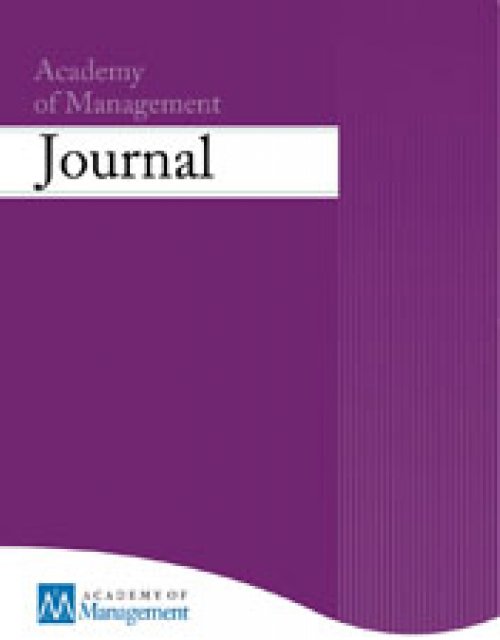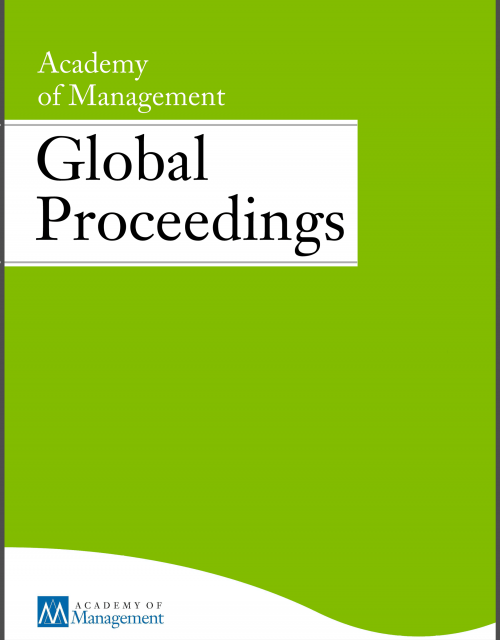Publication records
Subject(s)
Entrepreneurship; Finance, accounting and corporate governance; Technology, R&D management
Keyword(s)
Crowdfunding, funding of science, organizational theory, citizen science, R&D
Crowdfunding has gained traction as a mechanism to raise resources for entrepreneurial and artistic projects, yet there is little systematic evidence on the potential of crowdfunding for scientific research. We first briefly review prior research on crowdfunding and give an overview of dedicated platforms for crowdfunding research. We then analyze data from over 700 campaigns on the largest dedicated platform, Experiment.com. Our descriptive analysis provides insights regarding the creators seeking funding, the projects they are seeking funding for, and the campaigns themselves. We then examine how these characteristics relate to fundraising success. The findings highlight important differences between crowdfunding and traditional funding mechanisms for research, including high use by students and other junior investigators but also relatively small project size. Students and junior investigators are more likely to succeed than senior scientists, and women have higher success rates than men. Conventional signals of quality–including scientists’ prior publications–have little relationship with funding success, suggesting that the crowd may apply different decision criteria than traditional funding agencies. Our results highlight significant opportunities for crowdfunding in the context of science while also pointing towards unique challenges. We relate our findings to research on the economics of science and on crowdfunding, and we discuss connections with other emerging mechanisms to involve the public in scientific research.
© 2019 Sauermann et al.
Volume
14
ISSN (Online)
1932-6203
Subject(s)
Economics, politics and business environment; Finance, accounting and corporate governance
Keyword(s)
German banking sector, low interest period, profitability, hidden and open reserves
JEL Code(s)
G21, G28
In recent years, the German banking sector has overcome major challenges such as the global financial crisis and the European debt crisis. This paper analyses a recent development as a particular determinant of the future outlook for the German banking sector. Interest rates are at historically low levels and may remain at these levels for a considerable period of time. Such levels pose a specific challenge to banks which are heavily dependent on interest income, as is the case for most German banks. We consider different interest rate scenarios and analyse the extent to which they cause a further narrowing of the interest rate margin. Our
results indicate that a projected decline in this margin will result in no more than 20% of German banks earning a cost of capital of 8% by the end of this decade. This decline is somewhat alleviated by the fact that German banks can apply a special feature of German accounting standards by using hidden and open reserves.
© 2017 Western Economic Association International
Volume
37
Journal Pages
156–169
ISSN (Online)
1465-7287
ISSN (Print)
1074-3529
Subject(s)
Human resources management/organizational behavior
Keyword(s)
Personality, person-organization fit, cross-cultural adjustment, MBTI, expatriate assignment, emotions, work-life balance
The case tells a story of young European female manager joining a start-up operating in South-East Asia and facing challenges in adjusting to the work and life in a new environment. The protagonist finds it difficult to cope with a work situation where self-imposed expectations of excellence are difficult to achieve and with a life situation where social support is missing. The case culminates in the protagonist’s breakdown in an office meeting due to perceived failure to deliver on work tasks and to meet the expectations of the boss she respects and admires.
| buy now | buy now | buy now |
Subject(s)
Human resources management/organizational behavior
This book is a collection of challenging cases in executive coaching from the annals of the ESMT-Berlin Coaching Colloquia - yearly events for experienced professionals committed to advancement of the coaching profession. In the period of 2009-2018, hundreds of difficult cases were discussed by coaches from all over the world in an intensive but safe environment of the ESMT Berlin Campus. This volume presents a few of those cases to the interested public and offers a unique opportunity to explore the work of coaches from within and to reflect upon ways professionals approach ambiguous moments in their practice. The cases do not serve the purpose to endorse or critique a particular coaching choice, but rather give the reader an opportunity to think about their own ways of handling professional challenges in coaching engagements. The book can be an exciting self-development tool or instructional material for courses in coaching training or supervision.
Second edition published 2021.
ISBN
978-1790860722
Subject(s)
Marketing
Keyword(s)
inspirational appeals, personal selling, customer emotions, influence tactics
JEL Code(s)
M310
In personal selling, the inspirational appeal (IA) is a widely promoted tactic that aims at stimulating customers’ values and ideals, thereby evoking emotions and arousing their enthusiasm for a product. However, whether IAs in fact improve or undermine salespeople’s success in sales talks remains controversial. Therefore, the present study examines consequences and key contingencies of IAs in customer–salesperson interactions in a retailing context, using multi-source data from several retailing industries for three quantitative studies, comprising a total sample of 590 customer and 174 salesperson responses. Drawing on the Multiple Inferences Model (MIM), the authors show that an IA is likely to drive the customer’s inference that the salesperson holds ulterior motives. IAs seem to be particularly detrimental for salespeople with a lack of customer orientation. Beyond expanding research on influence tactics and the ambivalent role of IAs in retailing interactions, these findings can guide practitioners about when to refrain from using an IA.
Volume
38
Journal Pages
323–343
ISSN (Online)
1557–7813
ISSN (Print)
0885–3134
Subject(s)
Entrepreneurship
Keyword(s)
Entrepreneurial firms, human capital, innovative performance, motives, start-up joiners
We examine whether start-ups attract employees with different pecuniary and non-pecuniary motives than small or large established firms. We then explore whether such differences in employee motives may lead to differences in innovative performance across firm types. Using data on more than 10,000 U.S. R&D employees, we find that start-up employees (“joiners”) place lower importance on job security and salary but greater importance on independence and responsibility. Start-up employees have higher patent output than employees in small and large established firms, and this difference is partly mediated by employee motives - especially joiners’ greater willingness to bear risk. We discuss implications for research as well as for managers and policy makers concerned with the supply of human capital to entrepreneurship and innovation.
Copyright © 2017 Strategic Management Society
Volume
12
Journal Pages
423–454
Subject(s)
Strategy and general management; Technology, R&D management
Keyword(s)
Inventor mobility, alliance formation, interfirm collaboration, technological capabilities, pharmaceuticals
We link the hiring of R&D scientists from industry competitors to the subsequent formation of collaborative agreements, namely technology-oriented alliances. By transferring technological knowledge as well as cognitive elements to the hiring firm, mobile inventors foster the alignment of decision frames applied by potential alliance partners in the process of alliance formation thereby making collaboration more likely. Using data on inventor mobility and alliance formation amongst 42 global pharmaceutical firms over 16 years, we show that inventor mobility is positively associated with the likelihood of alliance formation in periods following inventor movements. This relationship becomes more pronounced if these employees bring additional knowledge about their prior firm’s technological capabilities and for alliances aimed at technology development rather than for agreements related to technology transfer. It is weakened, however, if the focal firm is already familiar with the competitor’s technological capabilities. By revealing these relationships, our study contributes to research on alliance formation, employee mobility, and organizational frames.
With permission of the Academy of Management
Volume
61
Journal Pages
2026–2052
Subject(s)
Human resources management/organizational behavior
Keyword(s)
Startup, scale-up, challenges
We examine the role of career preferences, ability, and structural constraints in explaining first-time employment in startups or established firms. Using panel data on 2,243 U.S. science and engineering PhDs observed before and after entering the job market, we find that ex ante career preferences significantly explain who joins a startup, while ability plays a limited role. Many individuals who prefer to join startups prior to graduation take jobs in established firms, in part due to the limited availability of startup jobs and visa constraints. Interestingly, these individuals are more likely to leave their first position in established firms jobs to join a startup later in time. We discuss implications for founders, managers in established firms, as well as for future research and policy makers.
With permission of the Academy of Management
Volume
Tel Aviv
ISSN (Print)
2638-4892
Subject(s)
Economics, politics and business environment; Information technology and systems; Technology, R&D management
Keyword(s)
Internet access market, access regulation, investment, infrastructure, Next Generation Networks, broadband, telecom, cable operators and EU regulatory framework
JEL Code(s)
L96, L51
In this paper, we study how the coexistence of access regulations for legacy (copper) and fiber networks shapes the incentives to invest in fiber-based network infrastructures. To this end, we first develop a theoretical model that extends the existing literature by, among other things, considering alternative firms with proprietary legacy network (e.g., cable operators) and the presence of asymmetric mandated access to networks. In the empirical part, we test the theoretical predictions using a novel panel data from 27 EU member states pertaining to the last decade. Our main finding is that, in line with the theoretical results, stricter access regulations (i.e., a decrease in access price to legacy network and the adoption of fiber regulation) decrease the incumbent operators’ fiber investments. The estimated magnitude of these effects is economically significant. On the other hand, cable operators, who are responsible for the largest share of investments in fiber, are not affected by access regulation. Our paper thus provides policy insights for the on-going revision of the EU regulation framework for the electronic communications industry.
With permission of Elsevier
Volume
61
Journal Pages
613–652
Subject(s)
Ethics and social responsibility
Keyword(s)
Sustainability, real estate, environment, stakeholder theory
Journal Pages
85–88

